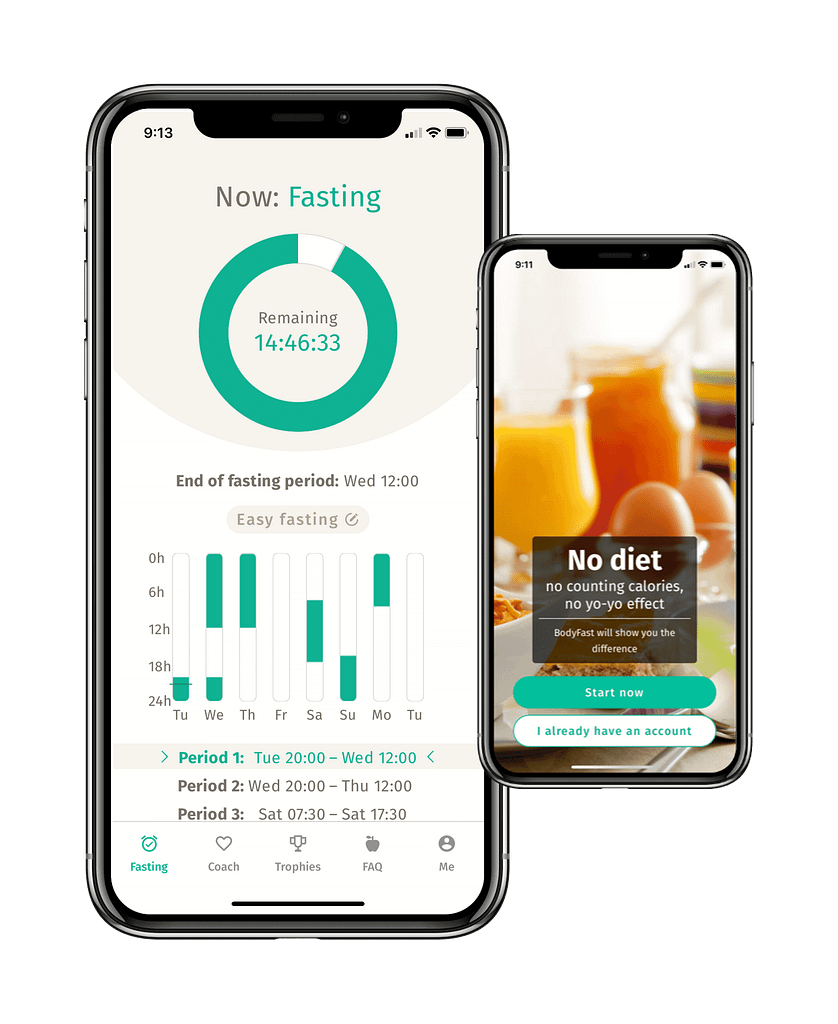Intermittent fasting (IF) is a powerful tool for weight loss, especially for beginners looking to shed a fixed number of pounds within a short period. It’s a pattern of eating that alternates between periods of fasting and eating, and it can be a powerful tool to help you shed pounds quickly. This beginner’s guide will take you through the basics of intermittent fasting, how it works, the benefits, and tips to get started.
What is Intermittent Fasting?
1. The 16/8 Method: This involves fasting for 16 hours each day and eating all your meals within an 8 hour window. For example, you might eat between 12 PM and 8 PM and fast from 8 PM to 12 PM the next day. As you get used to it, you can gradually increase to an 18/6 or even a 20/4 fasting window.
- Pro Tip: To track your fasting and eating windows easily, try using the BodyFast app. I’ve recommended this app to many of my clients, and they have found it incredibly helpful in sticking to their fasting schedules. Download BodyFast here.
2. The 5:2 Diet: This approach involves eating normally for five days of the week and restricting calorie intake to 500-700 calories on the other two days.
3. Eat-Stop-Eat: This method requires fasting for 24 hours once or twice a week. For example, you might finish dinner at 7 PM on Monday and not eat again until 7 PM on Tuesday.
4. Alternate Day Fasting: This involves alternating between days of eating normally and days of complete fasting or eating very few calories (around 500).
5. The Warrior Diet: This method involves eating small amounts of raw fruits and vegetables during the day and having one large meal at night, within a 4 hour eating window.

How Does Intermittent Fasting Work?
Intermittent fasting works by helping your body use its fat stores more effectively. When you fast, your insulin levels drop, which facilitates fat burning. Here’s a closer look at the physiological changes that happens during intermittent fasting:
- Insulin Levels: Insulin increases when you eat, and lower insulin levels during fasting facilitate fat burning.
- Human Growth Hormone (HGH): Fasting can increase levels of HGH, which promotes fat loss and muscle gain.
- Cellular Repair Processes: Fasting triggers autophagy, a process where cells remove damaged proteins and other waste.
- Gene Expression: Fasting can favorably change genes related to longevity and protection against disease.
Benefits of Intermittent Fasting
Intermittent fasting offers numerous benefits beyond weight loss:
- Weight Loss and Fat Loss: By reducing insulin levels, increasing HGH, and boosting norepinephrine, IF increases your metabolic rate and helps you burn more calories.
- Improved Metabolic Health: IF can reduce blood sugar levels, improve insulin sensitivity, and lower the risk of type 2 diabetes.
- Heart Health: It can reduce risk factors like bad cholesterol (LDL), inflammatory markers, blood sugar, and insulin resistance.
- Brain Health: Intermittent fasting may increase the brain hormone BDNF and promote the growth of new nerve cells, potentially protecting against Alzheimer’s disease.
- Longevity: Some studies in animals suggest that intermittent fasting may help you live longer.

How to Start Intermittent Fasting
Starting intermittent fasting can be simple. Here are some tips to help you begin:
- Choose Your Method: Pick the intermittent fasting method that best fits your lifestyle. The 16/8 method is often the easiest for beginners.
- Ease Into It: Don’t jump into a long fast immediately. Start with shorter fasting periods and gradually increase the length.
- Stay Hydrated: Drink plenty of water, herbal teas, or black coffee during fasting periods to stay hydrated.
- Eat Nutritious Meals: Focus on whole, nutrient dense foods during your eating windows. Include lean proteins, healthy fats, fruits, vegetables, and whole grains.
- Listen to Your Body: If you feel lightheaded, weak, or sick, break your fast. It’s important to listen to your body and ensure you’re not overdoing it.
- Be Consistent: Consistency is key. Stick to your chosen fasting method and give your body time to adjust.
Avoid Muscle Loss with Strength Training
While intermittent fasting can help you lose weight quickly, it’s crucial to include strength training in your routine to avoid muscle loss and maintain or even increase your metabolic rate. Losing weight without preserving muscle can lead to a slower metabolism and other health issues.
For beginners looking to incorporate strength training into their fitness routine, check out my detailed guide on How to Approach Strength Training as a Beginner.

Common Mistakes to Avoid
To make the most of your intermittent fasting journey, avoid these common errors:
- Overeating During Eating Windows: Avoid bingeing on unhealthy foods during your eating windows. Focus on balanced, nutritious meals.
- Not Drinking Enough Water: Staying hydrated is super important. Drink plenty of water throughout the day to support your body’s functions.
- Ignoring Your Body’s Signals: If you feel unwell, dizzy, or excessively hungry, listen to your body and adjust your fasting schedule as needed.




